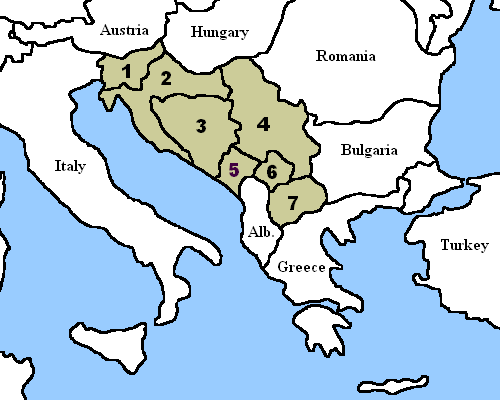
Andrej Klemenčić: Hermeticity of a Tribe and Obscure Nations
The break apart of Yugoslavia meant that the people living in that part of Europe had to face a new reality based on two facts: hermetical, single-cell patterns of social behaviour have been created and assumed national characteristics. On the other hand there are very few people living outside those surroundings who know who those nations are and where are their countries.
Two bars in the south of Spain. A waiter asks a person from former Yugoslavia: Where are you from? The person replies: Croatia. The reply presumed that the waiter would know where it is either because the country just joined the EU or because of some of its natural attributes. However, the only comment from the waiter was a polite semi-smile and shrugged shoulders clearly testifying he has no idea where Croatia would be.
In the second coffee shop a waiter asking the same question was told: Serbia. The reply presumed that the waiter could connect the word with the generally bad guys association following Serbian residents since the 90’s. However, the same kind of smile and shoulder mimic made it very clear that this geography lesson was unsuccessful as well.
A couple from Croatia, when they said in the centre of Spain where they were from got the line: “Yes, that’s where it snows a lot”.
“You are truly fantastically located between the Baltic and the Ottoman element”, is one of many comments one can hear in Spain when it comes to identifying anything east of the Italian border.
When the so-called “Dawn of the Nations” came to the Balkans in the early 90’s all those who advocated for this all-round national uprising, and that meant the vast majority of people, believed that their nations are great and that as such they will be recognized on the playground of international cultures, politics and economy.
Yet the figures decorated with symbols of red and white chess plate, eagles, other types of eagles and some kind of stars are so very small that no one should be surprised that after the war PR times of the mid 90’s they became and remained almost invisible in the playground of the big.
The creators of new nations from that time made one key mistake in judgement – they believed that the potentially negative context which might have been associated with former Yugoslavia’s one party system is an opportunity for promotion of smaller units that existed as integral parts of the country.
The mistake was the following: although the democratization in the parliamentary sense could be seen in positive light by most of the countries the small nations wanted to be embraced by, i.e. the Western nations, this by no means guarantees long term visibility.
Big systems are used to dealing with big problems. Demonstrations are big, unemployment is counted in millions, railway tracks in thousands of kilometres and and export in billions. Those systems have no capacity of genuinely understanding what a fistful of protesters want when they are screaming some words in an unknown language on a square in some provincial town, nor do they care that a suburb of a suburb east of something lost its economic engine, a small plastic factory which had a market while Yugoslavia existed.
Those big systems do business with other big systems because they can offer them a billion of something and get a billion of something in return.
This mathematics, simplified to the level of banality, seems to have bypassed the warmongering fathers of the post-Yugoslav nations. As a consequence, a provincially hermetic pattern of functioning has been created in which the exchange takes place between two units located within a country of a couple of million people.
By reducing the measures for units and the units themselves in order to achieve a comfortable pattern which is based on an exchange between “us” and “us”, rather then “us” and “them”, many achievements of Yugoslav multi-culturality have been erased, including multi-national marriages and dynamic cultural exchange.
In those societies a typical situation has been created where always the same musicians are playing the same kind of music on same squares courting their lady fans which only come from their own cultural context. Consequentially they are losing the sparks of inspiration, just as their societies are growing dumber by watching the prime time evening news main story – a report from a local exhibition of a grandma who switched from selling vegetables on a local market to painting landscapes.
While big business from large countries is opening a factory in another big country where primary products will be produced, assembled and sold, an automobile giant from the West has opened in an Eastern factory which during Socialism used to produce, assemble and sell cars, a factory of screws for the accelerator pedal. While a CEO of a company with 200,000 employees is courting a president of a country of 50 million by sending a birthday card with verses of an artist of who someone outside his village and maybe even his country has heard, a prime minister from a post-Yugoslav country is trying hard for a secretary of a deputy minister from a smaller ministry of a large country to say his surname correctly and maybe even memorize it.
Of course there are no nations of higher or lesser value, however, the internal systems of valorization are based on principles of a country or an individual being able to recognize a country and individual coming from it for what they are. The war in former Yugoslavia only temporarily increased interest in that part of the world as in the long run and because of the war a sentiment of great reservation and even fear towards the representatives of those nations has been created.
The stable system of former Yugoslavia and its size were some sort of a warranty that the money invested is safe. The current perception of those who are still pushing forth the story of “their” nations is in fact one big stereotype about small, half-criminalized societies where tribal relations are not only all but adapted to foreign investors, but the code of such behaviour is so difficult to break that it prevents an investor from quickly learning how the society is functioning, making the investment less likely.
Apart from branding the wild and the exotic aspect of societies of the South East of Europe, the key people behind their economy and social order have very little to offer. Their culture export is insignificant and the economy subjected to models of hermeticity. As long as those key people continue to fail to understand that the hermeticity of big nations is measured by the verses of Shakespeare, paintings of da Vinci and IKEA, they will continue to work against themselves and the people which they brought into a situation of chronic unemployment, boring prime time news and countries which look like a smallish neighbourhood of a normal-size city.
Category: At first hand, Our writings